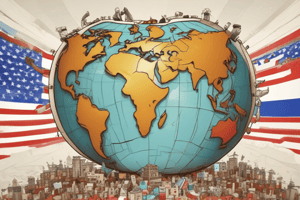Podcast
Questions and Answers
Political Science is solely the study of historical events.
Political Science is solely the study of historical events.
False (B)
Comparative Politics focuses on analyzing different political systems and behaviors across countries.
Comparative Politics focuses on analyzing different political systems and behaviors across countries.
True (A)
International Relations examines the interactions between states and non-state actors.
International Relations examines the interactions between states and non-state actors.
True (A)
Public Administration is concerned with the creation of new laws.
Public Administration is concerned with the creation of new laws.
Totalitarianism allows for multiple political parties and freedoms.
Totalitarianism allows for multiple political parties and freedoms.
The concept of Legitimacy refers to the recognized right to exercise power.
The concept of Legitimacy refers to the recognized right to exercise power.
Qualitative methods in Political Science include statistical analysis.
Qualitative methods in Political Science include statistical analysis.
Current trends in politics include the rise of technology's influence on communication.
Current trends in politics include the rise of technology's influence on communication.
Study Notes
Definition
- Political Science: The study of politics, government systems, and political behavior.
Key Areas of Study
-
Political Theory
- Examines concepts such as justice, power, rights, and the role of the state.
- Analyzes the works of philosophers like Plato, Aristotle, Machiavelli, Hobbes, Locke, Rousseau, and Marx.
-
Comparative Politics
- Studies and compares political systems and behaviors from different countries.
- Analyzes regime types: democracies, authoritarianism, totalitarianism.
-
International Relations
- Focuses on interactions between states, international organizations, and non-state actors.
- Key concepts include nationalism, globalization, international conflict, and diplomacy.
-
Public Administration
- Examines the implementation of government policy and the organizational structures of government agencies.
- Focuses on bureaucracy, public management, and administrative law.
-
Political Economy
- Analyzes the relationship between politics and economics.
- Explores how economic theories influence public policy and governance.
Methodologies
- Qualitative Methods: Interviews, case studies, and text analysis.
- Quantitative Methods: Statistical analysis, surveys, and experiments.
Key Concepts
- Power: The ability to influence or outright control the behavior of people or institutions.
- Authority: Recognized right to exercise power.
- Legitimacy: Acceptance and justification of a political system's authority.
- Ideology: A set of beliefs and values that influence political behavior and policy.
Important Political Systems
- Democracy: Government by the people, characterized by free and fair elections.
- Authoritarianism: Concentration of power in a single authority or party, with limited political freedoms.
- Totalitarianism: An extreme form of authoritarianism where the state seeks to control all aspects of life.
Current Trends
- Rise of populism and nationalism in various countries.
- Increasing importance of global issues like climate change, terrorism, and migration.
- The impact of technology and social media on political communication and mobilization.
Political Science
- Study of politics, government systems, and political behavior
- Examines the use of power, authority, and legitimacy to govern
- Analyzes various political systems, ideologies, and social movements
Key Areas of Study
- Political Theory: Explores fundamental questions about justice, power, rights, and the role of the state.
- Examines the works of philosophers like Plato, Aristotle, Machiavelli, Hobbes, Locke, Rousseau, and Marx.
- Comparative Politics: Studies and contrasts political systems and behavior across different countries.
- Analyzes regime types including democracies, authoritarianism, and totalitarianism.
- International Relations: Focuses on interactions between states, international organizations, and non-state actors.
- Key concepts include nationalism, globalization, international conflict, and diplomacy.
- Public Administration: Examines the implementation of government policy and the organizational structures of government agencies.
- Focuses on bureaucracy, public management, and administrative law.
- Political Economy: Analyzes the relationship between politics and economics.
- Explores how economic theories influence public policy and governance.
Methodologies
- Qualitative Methods: Interviews, case studies, and text analysis
- Quantitative Methods: Statistical analysis, surveys, and experiments
Key Concepts
- Power: The ability to influence or control the behavior of people or institutions
- Authority: Recognized right to exercise power
- Legitimacy: Acceptance and justification of a political system's authority
- Ideology: A set of beliefs and values that influence political behavior and policy
Important Political Systems
- Democracy: Government by the people, characterized by free and fair elections.
- Authoritarianism: Concentration of power in a single authority or party, with limited political freedoms.
- Totalitarianism: An extreme form of authoritarianism where the state attempts to control all aspects of life.
Current Trends
- Rise of populism and nationalism in various countries
- Increasing importance of global issues like climate change, terrorism, and migration
- Impact of technology and social media on political communication and mobilization
Studying That Suits You
Use AI to generate personalized quizzes and flashcards to suit your learning preferences.
Description
Explore the foundational concepts of political science including political theory, comparative politics, international relations, and public administration. This quiz covers the key areas of study and important figures in the field, providing a comprehensive overview of political systems and behavior.




